Willie Mae Thornton
b. December 11th, 1926 in Montgomery (Alabama)
d. July 25th, 1984 in Los Angeles (California)
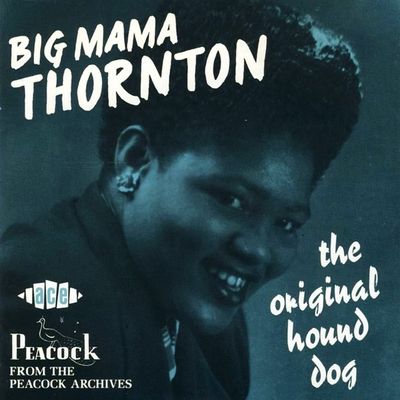
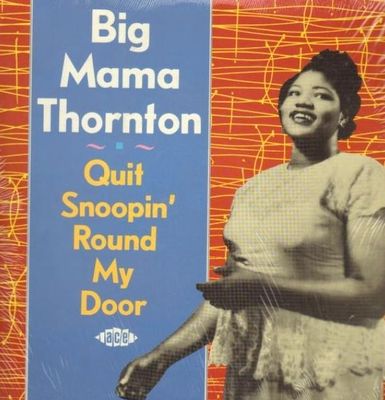
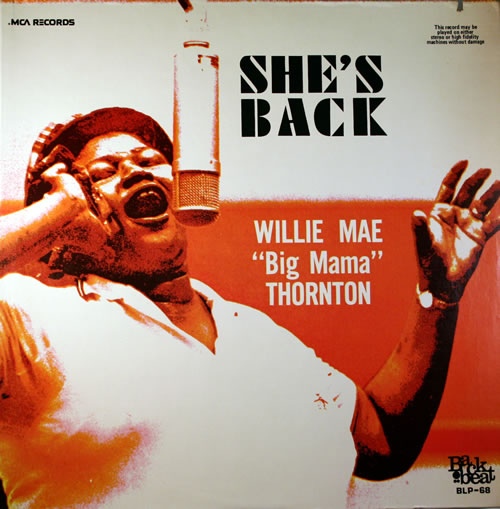
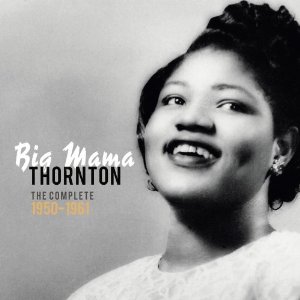
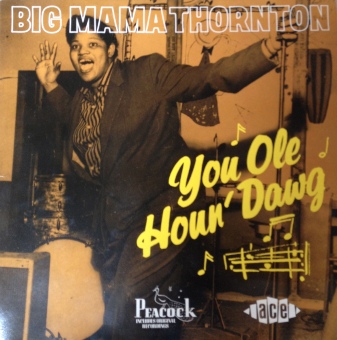
THE ORIGINAL HOUND DOG
Ace
1950 - 1957
QUIT SNOOPIN' AROUND MY DOOR
Ace
1950 - 1957
SHE'S BACK
MCA
Backbeat
1951 - 1957
THE COMPLETE 1950 - 1961
Le Chant du Monde
1950 - 1961
YOU OLE HOUN' DAWG
Ace
1950 - March 1964
Willie Mae Thornton nait à Ariton (Alabama) mais grandit un peu plus au nord à Montgomery. Elle vit ses premières expériences musicales dans l'église baptiste où son père est révérend et sa mère chante. Quand sa mère meurt, elle quitte l'école et travaille au nettoyage d'une taverne locale. Willie Mae quitte le foyer familial en 1940 après avoir gagné un concours de chant et rejoint la Hot Harlem Revue (un spectacle itinérant qui tourne dans le sud ou elle cotoie notamment le chanteur Billy Wright) où on la surnomme rapidement "The New Bessie Smith". En autodidacte, elle apprend la danse, le chant, l'harmonica et la batterie. Plus tard, en 1948, elle s'installe à Houston où elle joue notamment à l'Eldorado Club. Son premier enregistrement a lieu en 1950 avec les Harlem Stars pour le label E&W. Forte de cette expérience, elle devient la chanteuse du groupe de Joe Fritz avant d'être découverte par le producteur Don Robey. Celui-ci lui fait un contrat sur son label Peacock. D'abord accompagnée par l'orchestre de Joe Scott puis par celui de Bill Harvey, elle démontre rapidement ses immenses qualités de chanteuse puissante et sensible dans un style nettement R&B avec des morceaux comme "Cotton picking blues" et "Everytime I think of you". En aout 1952, Big Mama est associée à l'orchestre de Johnny Otis le temps d'une superbe séance qui donnera de remarquables chefs d'oeuvre : "They call me Big Mama", "Walkin' blues" (avec la superbe guitare de Pete Lewis), "Hound dog" (composé par Jerry Leiber & Mike Stoller) son grand hit qui ne lui rapportera finalement que peu de royalties, "Hard times". Grâce au succès de "Hound dog", elle prend part au Blues Consolidated Package Show aux côtés de Bobby "Blue" Bland, Johnny Ace, Junior Parker. Elle tourne aussi occasionnellement avec le Johnny Otis Show. Après toutes ces tournées, elle retourne en studio et retrouve l'orchestre de Bill Harvey ("You don't move me no more" avec le jeune Roy Gaines à la guitare). Big Mama collabore avec Peacock jusqu'en 1957. Après cette période faste, la carrière de Big Mama marque le pas. Elle part pour la baie de San Francisco puis Los Angeles et s'intègre à la scène locale. Elle enregistre pour les labels de Nat Mac Coy (Carolyn, Sotoplay) en 1963 et participe, l'année suivante, au Monterey Jazz Festival (elle reviendra en 1966 et 1968).
Willie Mae Thornton was born in Ariton (Alabama) but grew a little further north in Montgomery. She lived her first musical experiences in the Baptist church where her father is a minister and her mother sings. When her mother dies, she leaves school and works cleaning a local tavern. Willie Mae left home in 1940 after winning a singing contest and joined the Hot Harlem Revue (a traveling show which tours in the south in which she met singer Billy Wright) where she was quickly nicknamed "The New Bessie Smith". Self-taught, she learned dancing, singing, harmonica and drums. Later, in 1948, she moved to Houston where she plays regularly at the Eldorado Club. Her first recording took place in 1950 with the Harlem Stars for the label E&W. With this experience, she became the lead singer of Joe Fritz's band before being discovered by producer Don Robey. He offers her a recording contract on his Peacock label. Firstly accompanied by the Joe Scott orchestra then by Bill Harvey, she quickly demonstrates her immense qualities of powerful and sensitive singer in a much R&B style with songs like "Cotton picking blues" and "Everytime I think of you". In august 1952, Big Mama is associated with the Johnny Otis Orchestra for a superb session that will give remarkable masterpieces : "They call me Big Mama", "Walkin' blues" (with the superb guitar of Pete Lewis), "Hound dog" (written by Jerry Leiber & Mike Stoller) her big hit that ultimately bring her little royalties, "Hard times". Through the success of "Hound dog", she takes part in the Blues Consolidated Package Show alongside Bobby "Blue" Bland, Johnny Ace, Junior Parker. She also tours occasionally with the Johnny Otis Show. After all these tours, she returned to the studio with the Bill Harvey Orchestra ("You don't move me no more" with the young Roy Gaines on guitar). Big Mama works with Peacock until 1957. After this auspicious period, Big Mama's career stalled. She moved to San Francisco Bay area and then Los Angeles and integrates to the local scene. She recorded for Nat Mac Coy's labels (Carolyn, Sotoplay) in 1963 and participated, the following year, in the Monterey Jazz Festival (she will return in 1966 and 1968).
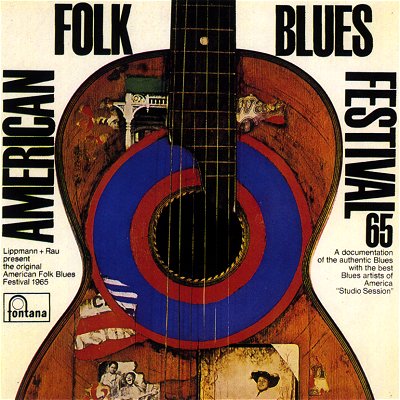
AMERICAN FOLK BLUES FESTIVAL '65
Fontana
L+R
October 1965
Sur la côte ouest, Big Mama grave quelques titres épars sur de petits labels (Carolyn, Sotoplay, Sharp, Speed) qui ne rencontrent quasiment aucun succès. Pourtant, cet insuccès ponctuel ne l'empêche pas d'être engagée pour la tournée de l'American Folk Blues Festival en 1965 aux côtés de Buddy Guy et Eddie Boyd. Ce voyage en Europe est son premier. Sur le disque immortalisant la tournée, on trouve une version de "Hound dog" superbement exécutée qui figure parmi les meilleurs moments de cet illustre événement.
On the west coast, Big Mama cut scattered titles on small labels (Carolyn, Sotoplay, Sharp, Speed) that hardly meet any success. Yet, this punctual lack of success does not prevent her from being hired for the American Folk Blues Festival 1965 tour alongside Buddy Guy and Eddie Boyd. This trip is her first in Europe. On the disc immortalizing this tour, there is a version of "Hound dog" beautifully executed which is among the highlights of this illustrious event.
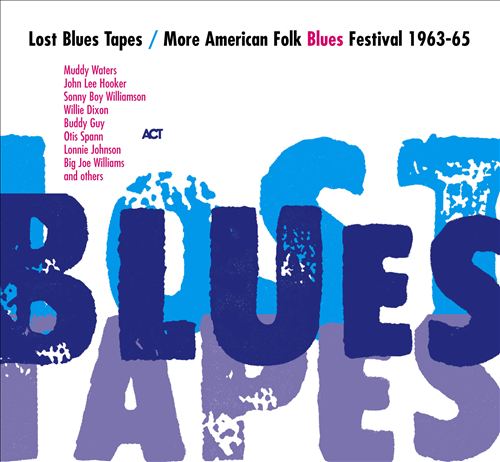
THE LOST BLUES TAPES vol.1
ACT
October 1965
Sur cette anthologie recueillant des inédits de l'American Folk Blues Festival, on peut écouter une prise alternative du "Hound dog" de Big Mama Thornton.
On this anthology collecting unissued American Folk Blues Festival tracks, we can listen an alternate take of "Hound dog" of Big Mama Thornton.
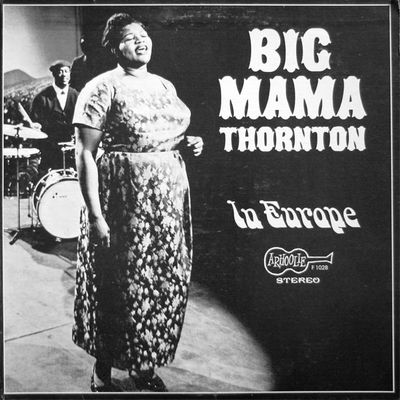
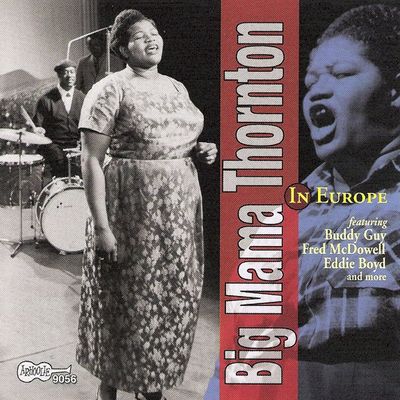
IN EUROPE
Arhoolie
BALL N' CHAIN
Arhoolie
October 1965
C'est Chris Strachwitz qui persuada Horst Lippman d'engager Big Mama Thornton pour la tournée de l'American Folk Blues Festival. Il dut aussi convaincre Big Mama elle-même et son manager Jim Moore. Pendant la tournée, Strachwitz organise cette séance londonienne avec les musiciens engagés. Il s'agit d'un groupe extraordinaire composé de Buddy Guy, Eddie Boyd, Jimmy Lee Robinson et Fred Below. La cohésion et l'inspiration des artistes sont constamment brillantes. Big Mama domine l'ensemble de sa stature imposante et de sa superbe voix. Chris Strachwitz a eu aussi l'excellente idée d'associer Big Mama avec Fred Mac Dowell : une association qui donne lieu à des titres formidables comme "My heavy load" et "Chauffeur blues". Quelques pépites : "Sweet little girl", "Unlucky girl", "Hound dog", "Session blues" (ou elle tient la batterie), "Down home shakedown" (à deux harmonicas avec Big Walter Horton). Sur la version CD, six morceaux ont été ajoutés ainsi qu'une interview de 15 minutes. Un document indispensable dans toute discothèque blues ! Quelques titres ont été repris dans la compilation "Ball n' chain".
This is Chris Strachwitz who persuaded Horst Lippman engaging Big Mama Thornton for the American Folk Blues Festival tour. He must also convince Big Mama herself and his manager Jim Moore. During the tour, Strachwitz organizes this session in London with the involved musicians. This is an extraordinary backing band consisting of Buddy Guy, Eddie Boyd, Jimmy Lee Robinson and Fred Below. Cohesion and inspiration of artists are constantly bright. Big Mama dominates everybody with her imposing stature and her superb voice. Chris Strachwitz also had the great idea to combine Big Mama with Fred Mac Dowell : an association that leads to great titles like "My heavy load" and "Chauffeur blues". Some gems : "Sweet little girl", "Unlucky girl", "Hound dog", "Session blues"(in which she is behind the drums), "Down home shakedown" (two harmonicas with Big Walter Horton). On the CD version, six tracks were added as well as a 15-minutes interview. An indispensable document for any blues collection ! Some titles were included in the compilation "Ball n' chain".
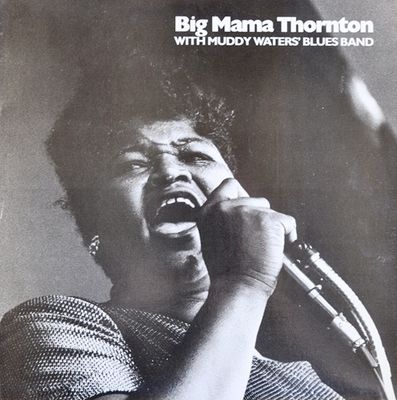
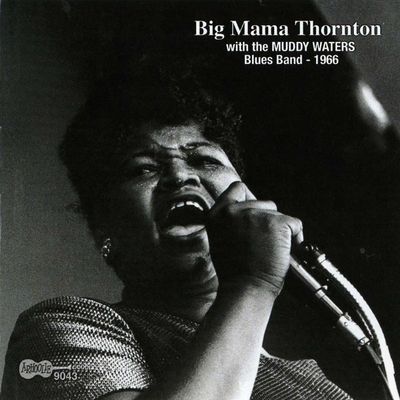
WITH MUDDY WATERS BLUES BAND
Arhoolie
BALL N' CHAIN
Arhoolie
April 1966
Gravé à San Francisco sous la supervision de Chris Strachwitz pour son label Arhoolie, ce disque rassemble Big Mama Thornton avec le groupe de Muddy Waters. Un peu dans la continuité de son précédent album pour ce label, il s'agit d'une séance de premier plan. Le groupe de Muddy est un modèle de souplesse et de justesse et Big Mama est au zénith de ses possibilités vocales. Cette association aboutit à un disque en tous points remarquables avec de nombreux grands moments : "Sometimes I have a heartache", "Black rat", "Everything gonna be alright", "Gimme a penny", "Wrapped tight", "Big Mama's blues". La version CD est enrichie de sept morceaux par rapport au microsillon. Quelques titres ont été repris dans la compilation "Ball n' chain".
Recorded in San Francisco under the supervision of Chris Strachwitz for his Arhoolie label, this album brings together Big Mama Thornton with the Muddy Waters' band. A bit in the continuity of his previous album for the label, it is a first-rate session. Muddy's band is a model of flexibility and accuracy and Big Mama is at the zenith of her vocal possibilities. This combination results in a remarkable disc with many great moments : "Sometimes I have a heartache", "Black rat", "Everything gonna be alright", "Gimme a penny", "Wrapped tight", "Big Mama's blues". The CD version is enriched with seven sides compared to the LP. Some titles were included in the compilation "Ball n' chain".
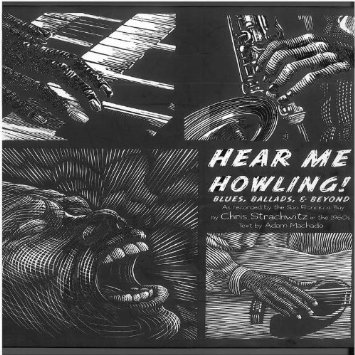
HEAR ME HOWLING
Arhoolie
October 1966 / 1970
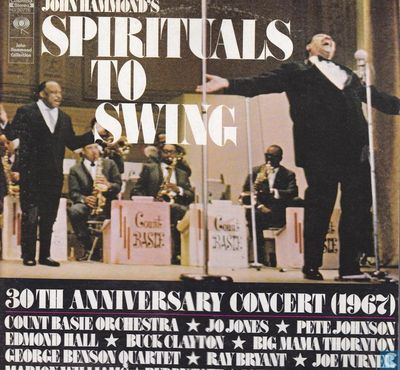
SPIRITUALS TO SWING
Columbia
January 1967
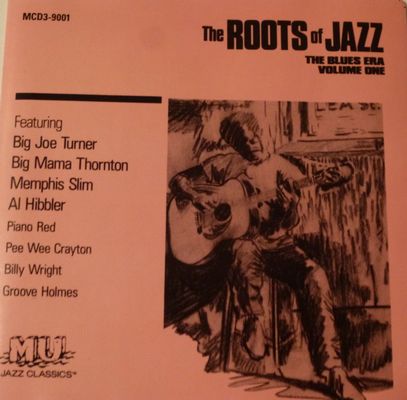
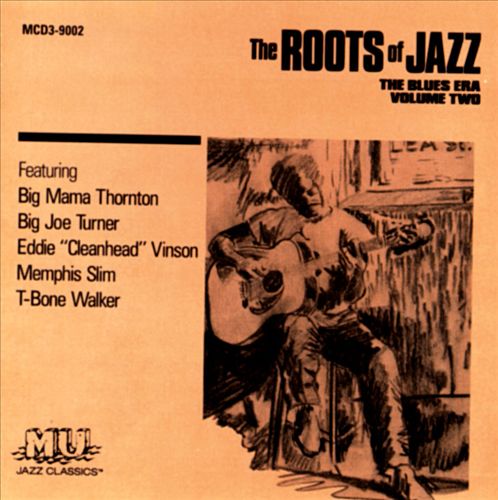
THE ROOTS OF JAZZ : THE BLUES ERA vol. 1&2
Mu Jazz
1967
BALL AND CHAIN
Arhoolie
BALL N' CHAIN
Arhoolie
January 1968
Le LP "Ball and chain" rassemble des morceaux de Big Mama Thornton, Lightnin' Hopkins et Larry Williams. Concernant Big Mama, il contient notamment le puissant et entrainant "Wade in the water" et "Ball n' chain". Lors de cette séance, elle est accompagnée par Everett Minor, Nat Dove, Bee Houston, Curtis Tillman et Gus Wright. Malgré son titre, ce LP n'a rien à voir avec le CD "Ball n' chain" qui est une compilation de ses faces Arhoolie.
The LP "Ball and chain" gathers songs of Big Mama Thornton, Lightnin' Hopkins and Larry Williams. Concerning Big Mama, it contains notably the powerful and leading "Wade in the water" and "Ball n' chain". In this session, she is accompanied by Everett Minor, Nat Dove, Bee Houston, Curtis Tillman and Gus Wright. Despite its title, this LP has nothing to do with the "Ball n' chain" CD which is a compilation of his Arhoolie sides.

STRONGER THAN DIRT
Mercury
March 1969
Après la période faste chez Arhoolie, Big Mama signe en 1969 chez Mercury. Pour ce label, elle enregistre "Stronger than dirt" avec un son et une production plus commerciaux qu'avant. Un album conçu pour le grand public, éclectique et inégal, qui peut décevoir. Sa voix est moins mise en valeur et les musiciens, un peu trop monolithiques, sont peu percutants. Bien que les musiciens présents ne soient ni cités sur la pochette ni dans la "Blues Discography", il semble qu'Everett Minor (saxophone), Nat Dove (piano) et Bee Houston (guitare) aient participé à ce disque.
After the auspicious times with Arhoolie, Big Mama sign in 1969 at Mercury. For this label, she recorded "Stronger than dirt" with a more commercial sound and production than before. An album designed for the general public, eclectic and uneven, which may disappoint. Her voice is less present and musicians, too monolithic, are less percussive. Although these musicians are not cited on the sleeve cover or in the "Blues Discography", it seems that Everett Minor (saxophone), Nat Dove (piano) and Bee Houston (guitar) were involved in this disc.
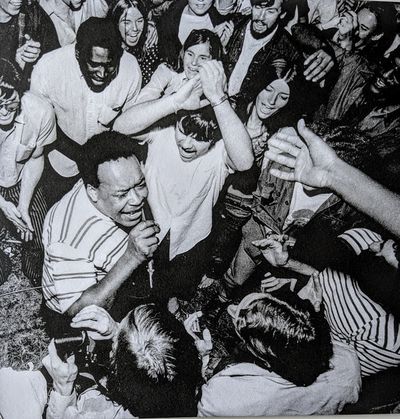
ANN ARBOR BLUES & JAZZ FESTIVAL 1969 vol.2
Third Man
August 1969
Sur la scène du célèbre festival d'Ann Arbor, Big Mama propose une sympathique version de "Ball and chain" malgré une qualité sonore peu satisfaisante.
On the stage of the famous Ann Arbor festival, Big Mama offers a nice version of "Ball and chain" despite an unsatisfactory sound quality.
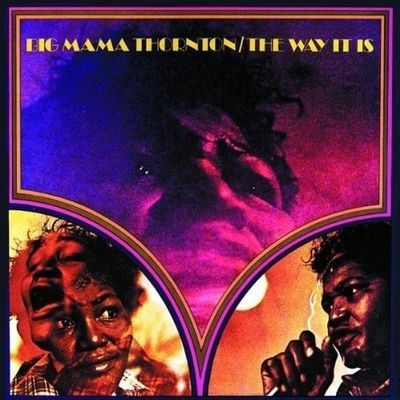
THE WAY IT IS
Mercury
October 1969
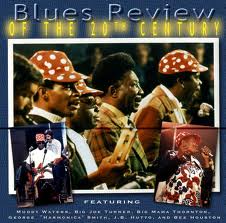
BLUES REVIEW OF THE 20TH CENTURY
Top Cat
October 1971
Concert donné par Big Mama Thornton, Muddy Waters, Big Joe Turner, George "Harmonica" Smith en octobre 1971. Elle interprète "Ball and chain", "Houn' dawg" et "Oh happy day".
Concert given by Big Mama Thornton, Muddy Waters, Big Joe Turner, George "Harmonica" Smith in october 1971. She sang "Ball and chain", "Houn' dawg" and "Oh happy day".

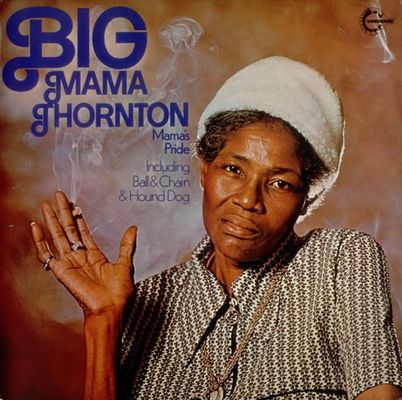
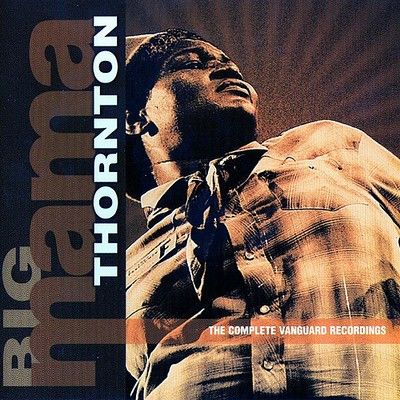
JAIL
Vanguard
MAMA'S PRIDE
Vanguard
THE COMPLETE VANGUARD RECORDINGS
Vanguard
November 1971
Recueil de deux concerts donnés dans des prisons (à Monroe et Eugene) à la fin de l'année 1971. Le disque démarre avec une version vigoureuse de "Little red rooster". Ses morceaux les plus célèbres comme "Hound dog" et "Ball and chain" sont interprétés avec fougue et feeling par Big Mama et ses musiciens (George "Harmonica" Smith, J.D. Nicholson, Bill Potter, Bee Houston, Steve Wachsman, Bruce Sieverson, Todd Nelson). Big Mama est en voix et l'ambiance s'avère chaude et festive. On remarque une superbe version allongée de "Rock me baby".
Collection of two concerts in prisons (in Monroe and Eugene) at the end of 1971. The album starts with a vigorous version of "Little red rooster". Her most famous songs like "Hound dog" and "Ball and chain" are interpreted with passion and feeling by Big Mama and her musicians (George "Harmonica" Smith, J.D. Nicholson, Bill Potter, Bee Houston, Steve Wachsman, Bruce Sieverson, Todd Nelson). Big Mama is in fine form and the atmosphere seems warm and festive. Note a beautiful extended version of "Rock me baby".

SAVED
Pentagram
1971
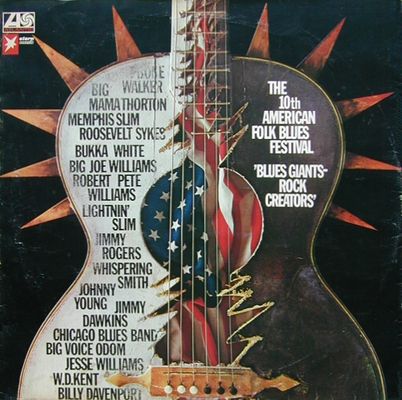
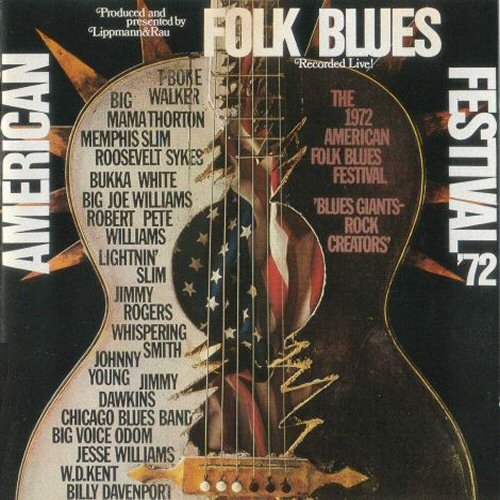
AMERICAN FOLK BLUES FESTIVAL '72
Atlantic
L+R
March 1972
Sur ce disque immortalisant la tournée de l'American Folk Blues Festival de 1972, Big Mama Thornton interprète deux bons morceaux : "Tell me baby" et "Ball and chain".
On this album immortalizing the American Folk Blues Festival 1972 tour, Big Mama Thornton performs two good songs : "Tell me baby" and "Ball and chain".
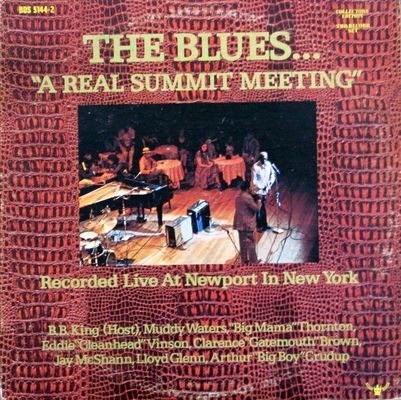

THE BLUES : A REAL SUMMIT MEETING
Buddah
LIVE AT NEWPORT
Blue Moon
Intermedia
Quicksilver
Astan
June 1973
Au début des années 70, Big Mama voit sa santé se détériorer. Sa consommation de drogue et d'alcool lui font perdre énormément de poids. De plus, en cette année 1973, un grave accident de voiture s'ajoute à ce triste constat. Elle participe, néanmoins, au Newport Jazz Festival cette année-là. Dans cette anthologie publiée par Buddah, elle chante "Little red rooster" et une énième version de "Ball and chain". Les musiciens - appliqués et précis - ne sont pas connus.
In the early 70's, Big Mama saw his health deteriorate. Drugs and alcohol consumption make her lose a lot of weight. In addition, in this 1973 year, a serious car accident is added to this sad statement. She is involved, however, in the Newport Jazz Festival that year. In this anthology published by Buddah, she sings "Little red rooster" and yet another version of "Ball and chain". Musicians - applied and accurate - are not known.
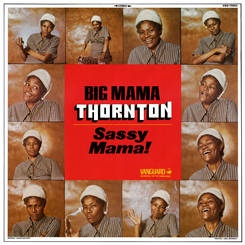

SASSY MAMA
Vanguard
THE COMPLETE VANGUARD RECORDINGS
Vanguard
Early 1975
Ce deuxième disque pour Vanguard est un de ses plus blues. Il y a quelques morceaux très prenants comme "Rolling stone", "Lost city", "Sassy mama", "Big Mama's new love" et sa rythmique funky. Accompagnée par des musiciens sobres et efficaces (Buddy Lucas au saxophone, Paul Griffin au piano, Cornell Dupree à la guitare), Big Mama Thornton livre ici un opus excellent dont le seul défaut n'est finalement que d'être trop court.
This second album for Vanguard is one of her most blues. There are some very catchy songs like "Rolling stone", "Lost city", "Sassy mama", "Big Mama's new love" and its funky rhythmic. Accompanied by temperate and effective musicians (Buddy Lucas on saxophone, Paul Griffin on piano, Cornell Dupree on guitar), Big Mama Thornton delivers here a great album whose only default is ultimately only be too short.

BIG MAMA SWINGS (in THE COMPLETE VANGUARD RECORDINGS)
Vanguard
1975
Il a fallu attendre l'année 2000 et la publication du coffret "The complete Vanguard recordings" pour entendre enfin cet album resté inédit jusqu'à présent. Il est construit sur un modèle similaire au précédent "Sassy mama" : même producteur (Ed Bland) et musiciens sensiblement identiques. On y retrouve le blues profond et attachant de Big Mama dans "Gonna leave you", le superbe "Mixed up feeling" à l'inspiration blues-funk, "Going fishing", "Happy me". Il est, tout de même, curieux qu'un disque d'une telle qualité soit resté inédit si longtemps.
It was not until 2000 and the release of the box-set "The complete Vanguard recordings" to finally hear this album remained unissued until now. It is constructed on a similar model to the previous "Sassy mama" : same producer (Ed Bland) and substantially identical musicians. It showcases the deep and engaging blues of Big Mama in "Gonna leave you", the superb "Mixed up feeling" and its blues-funk inspiration, "Going fishing", "Happy me". It is, nevertheless, curious that an album of such quality remained unissued so long.

THE RISING SUN COLLECTION
Just a Memory
April 1977
Lors de ce concert dans un club de Montreal (Canada), l'ambiance est tantôt sympathique, tantôt soporifique. Big Mama montre qu'elle garde une voix puissante même si on la sent fatiguée par moments. Certains morceaux paraissent un peu longs et ennuyeux, les reprises peu convaincantes ("Summertime", "Watermelon man"). Les musiciens me semblent clairement en retrait, peut-être à cause d'un mixage ou d'une prise de son inadéquat.
At this concert in a Montreal club (Canada), the atmosphere is sometimes friendly, sometimes soporific. Big Mama shows that she keeps her powerful voice even if she seems to be tired at times. Some songs are a little long and boring, the unconvincing covers ("Summertime", "Watermelon man"). The musicians seem clearly in the background, perhaps because of an inadequate mixing or sound recording.
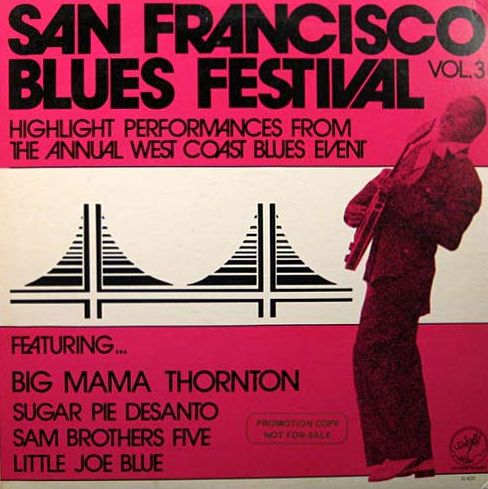
SAN FRANCISCO BLUES FESTIVAL vol.3
Solid Smoke
August 1979
Sur la scène du prestigieux festival de San Francisco organisé par Tom Mazzolini, Big Mama offre une prestation m bien que sa voix soit plus fatiguée ("Ball and chain"). Derrière elle, il y a Ron Thompson, Mark Naftalin, Mike Lewis et Harold Banks.
On stage at the prestigious San Francisco festival organized by Tom Mazzolini, Big Mama offers a significant performance although her voice is tired ("Ball and chain"). Behind her, there are Ron Thompson, Mark Naftalin, Mike Lewis and Harold Banks.

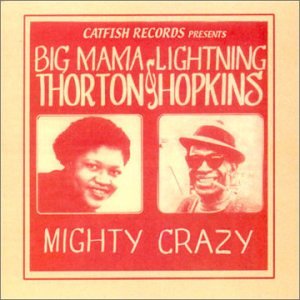
SHERMAN & FRIENDS
Lunar #2
MIGHTY CRAZY
Catfish
1980
Ces bandes en public datant de 1980 ont été captées sur la scène de l'Agora Club de Houston. Big Mama Thornton y est associée au jeune guitariste texan Sherman Robertson. Les bandes furent d'abord publiées sur un LP Lunar #2 puis, plus tard, en CD chez Catfish (avec des morceaux de Lightnin' Hopkins). Quatre titres bien exécutés qui montrent que, malgré ses ennuis de santé, Big Mama Thornton garde une réelle présence sur scène.
These live tapes from 1980 were captured on the Agora Club stage in Houston. Big Mama Thornton is associated with the young texan guitarist Sherman Robertson. The tapes were first published on a Lunar #2 LP and later in a Catfish CD (with tracks of Lightnin 'Hopkins). Four well-executed titles which show that, despite his health problems, Big Mama Thornton keeps a real presence on stage.
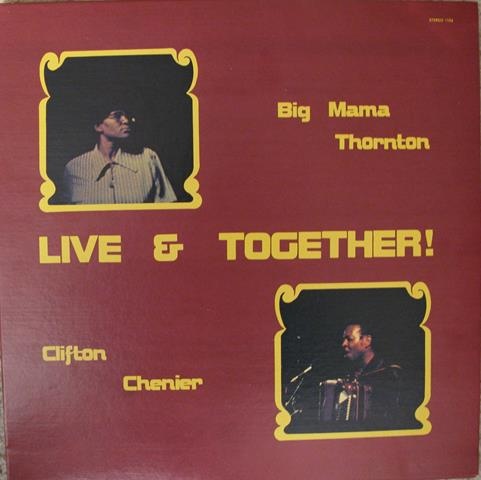
LIVE AND TOGETHER
Crazy Cajun
1981
Sur les cinq morceaux de ce microsillon, il n'y en a que deux ("Night time" et "Little red rooster") où Big Mama chante. Probablement gravé en 1981 à Houston, il s'agit surtout d'un disque de Clifton Chenier et de son band ou elle apparait en tant qu'invitée.
Of the five tracks of this LP, there are only two of them ("Night time" and "Little red rooster"), in which Big Mama sings. Probably cut in 1981 in Houston, it is mainly a Clifton Chenier album where she appears as a guest.